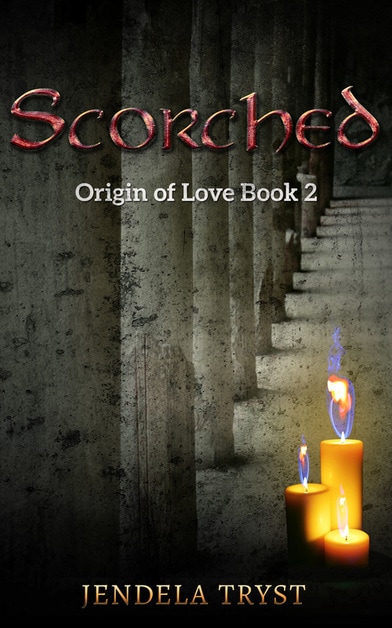Title of the work
Country of the First Edition
Country/countries of popularity
Original Language
First Edition Date
First Edition Details
Jendela Tryst, Scorched. Origin of Love Book 2. Converging Horizons, 2015, 194 pp.
ISBN
Official Website
jendelatryst.com (accessed: May 28, 2018)
Genre
Fiction
Myths
Novels
Romance fiction
Target Audience
Young adults
Cover

Cover photo courtesy of the Writer, from her personal website (accessed: May 28, 2018).
Author of the Entry:
Ayelet Peer, Bar-Ilan University, peerayel@taeuex.tau.ac.il
Peer-reviewer of the Entry:
Lisa Maurice, Bar-Ilan University, mauril68@gmail.com
Susan Deacy, University of Roehampton, s.deacy@roehampton.ac.uk

Picture curtesy of the Writer from her personal website (accessed: May 30, 2018).
Jendela Tryst (Author)
Tryst is an American author of Indonesian descent who publishes her books independently. She keeps her personal life private. She is very passionate about the themes of her books and has loved mythology since her schooldays. Her books focus on the love connection between mythical couples such as Cupid and Psyche or Hades and Persephone.
Sources:
Official website (accessed: May 30, 2018).
Online interview (accessed: May 30, 2018).
Bio prepared by Ayelet Peer, Bar-Ilan University, ayelet.peer@gmail.com
Questionnaire
1. What drew you to writing/working with classical antiquity?
It began when I was eight years old. My eldest sister, seven years my senior who was charged with babysitting me, told stories for entertainment (usually because our one TV was occupied by my gaming brother). When she ran out of fairytales, she pulled out her high school required reading which was a compilation of Greek myths. She summarized the stories and treated them like fairy tales. Ever since then, I was hooked.
2. What challenges did you face in selecting, representing, or adapting particular myths or stories?
The biggest challenge was creating sympathetic characters and explaining their oftentimes odd behaviors to an audience of modern critical thinkers. I’m not going to lie; I struggled to explain why Eros would not rescue Psyche as soon as he could when his mother was tormenting her. In the actual myth he seems so petty and vindictive. I also wanted Psyche to be more developed. Honestly, she is the only mortal female in Greco-Roman mythology who entered the Underworld in the flesh. The Underworld, the scariest place in the universe. She’s a pretty amazing heroine who, in my opinion, does not get enough credit.
3. Did you think about how they would translate for young readers, esp. in (insert relevant country)?
I didn’t worry too much because the characters themselves were young, but intelligent, passionate though a little naïve, struggling to gain respect from a larger, older, more jaded community. Honestly, I think those feelings reverberate in a lot of young people across all cultures. My main worry is trying to get young folks to give the book a chance. Many young readers may be turned off by the slightly academic slant of the story, which is why I wanted to focus on the romance. Honestly, who doesn’t love a great love story?
4. How concerned were you with "accuracy" or "fidelity" to the original? (another way of saying that might be – that I think writers are often more "faithful" to originals in adapting its spirit rather than being tied down at the level of detail – is this something you thought about?)
Absolutely. I have always been impressed with writers who are able to take well-known stories and create something fresh. The most common example in recent years have been fairy tales like Beauty and the Beast, Cinderella, even Sleeping Beauty in Maleficent’s point of view, all of which intrigue me. However, for me, accuracy is extremely important, otherwise the new versions just don’t seem believable. At the same time, the "spirit" of any story is very subjective, which is why this "experiment" has been so rewarding for me. I know how much Eros and Psyche the myth means to me, but it was so heartwarming to hear from so many people who shared my viewpoint or could at least appreciate it.
5. Why do you think classical / ancient myth and literature continue to resonate with young audiences?
What a great question. I believe anything that is universal and can withstand the test of time will resonate with young audiences, because young audiences are part of the human race (although some might argue with me on that. ;)) The truth is, and I’m sorry for sounding cliché, but young people are the future, and I’m something of an optimist when it comes to the future. Youth today are proving to be more intelligent, worldlier, and more compassionate than any generation before them. If anything, bringing antiquity back with all its wisdom and all its lessons so that the same mistakes don’t happen again and again is what will help young people when they eventually inherit this world.
6. Are you planning any further forays into classical material?
Absolutely. My upcoming novel, Hell’s Captive, is based on the myth of Hades and Persephone. After that, I am considering delving into the story of Atalanta and the three golden apples. I wish to do for Greco-Roman Mythology what many have already done with common fairy tales. I want to add twists to otherwise well-known stories. And for those who don’t know the stories, kindle a new interest. There is so much room for interpretation in these myths, as obvious in the many different ways they were told throughout history. It stretches the imagination greatly and I love the challenge of pushing the boundaries of the tale, yet still remaining true to the original story.
7. Do you have a background in classical education (Latin at school or classes at the University?)
I took four years of Latin in High School and one year in college, but my interest in antiquity began long before that. I chose Latin just so I could learn how to translate my favorite myths from its "purer" form.
8. What sources are you using? Scholarly work? Wikipedia? Special Internet websites? (which ones?)
For Eros and Psyche, I used a combination of Ovid’s Metamorphoses, The Golden Ass by Apuleius and also as many different versions of the myth I could get my hands on. I wanted to borrow the most common themes and stretch out the gaps that appeared in all the different versions. I know growing up, these gaps caused me great grief, because they felt so incomplete and not well thought out. Then I realized that true beauty lay in the gaps. Where the holes were, a whole other story was waiting to be told. In the end, what began as just an exercise in creativity became an entire trilogy.
Prepared by Ayelet Peer, Bar-Ilan University, ayelet.peer@gmail.com
Summary
In the second installment of the trilogy, Psyche wanders in Eros’ magical palace and her relationship with Eros deepens, until her curiosity results in tragic consequences. Psyche is frightened yet intrigues by her new fantastic surroundings. She tries to discover where she is and more importantly, who is she married to. As she falls more in love with her husband, so does her curiosity deepen to know who he really is.
Analysis
The second installment of Tryst’s trilogy is entitled Scorched, which has multiple meanings in the story. Firstly it refers to the growing love between the main characters, Eros and Psyche. But it also hints at the end, at what will happen when Psyche moves the candle a bit too close to the sleeping Eros. As in the first novel, the main premise of the love between Eros and Psyche is ancient. Yet what is interesting and new is the author’s take on how the characters start and end their journey.
As in the first book, the author dedicates many pages to describing Psyche’s character. She does not like to be left in the dark (literally) of the palace; she does not like to be caged. She is adventurous and courageous, albeit a bit hot-headed. Psyche ventures on a dangerous excursion outside the palace only to encounter more familiar mythical beings, such as Narcissus and a Satyr. The outside world is filled with mysterious dangers, but Psyche is not one to cower. She seeks knowledge, and her everlasting passion for it is manifested in the endless library of the palace, where all the world’s records are stored and continuingly written. This is how she finds out about the end of the Trojan War and this is where she recites ancient poems with her mysterious husband.
As in the first book, the beauty and the beast motif is notable. Psyche falls in love with her unseen husband due to his character. In order to really know each other, they talk. Talking is very important and creates the necessary intimacy between them before they even touch each other. Psyche also returns home and stays with her father in his last moments. This is quite symbolic, as the girl loses her father and in the process becomes a woman and gains her man.
The novel focuses closely on the continuing romance of Psyche and Eros while in the background there are alarming signs of an inevitable, looming disaster. Hermes, the messenger of the gods and Eros’ friend, is a recurring character, with whom Eros converses and seeks advice. The god of love is thus exposed in his weakness and fears. The fact that two gods can talk to each other like ordinary human friends is also telling. Although they scorn the immortal Psyche, they are not really superior to humans at all in their emotions or behaviour. Quite the contrary, for it seems that they lack true feelings. The story of Narcissus, the self-absorbed youth is a mirror which reflects the exact opposite of Psyche and Eros mutual love and respect. Narcissus’ tale is hinted at, when Psyche gets a glimpse of him in the forest.
Of course, in the end, curiosity gets the better of Psyche. Yet here again we have a twist. What hurts Psyche the most is the lie of omission by her husband. She had already met Eros before without knowing and tormented herself since then. Thus Psyche’s betrayal of Eros is compared with his lying to her. From this deep crisis in their relations they will have to decide whether their love is strong enough to defeat the challenges ahead. The story is then picked up and continued in the third book of the trilogy.
Further Reading
Maurice, Lisa, "Cupid and Psyche for Children" in Regine May and Stephen J. Harrison, eds., Cupid and Psyche: The Reception of Apuleius’ Love Story since 1600, Berlin, Boston: De Gruyter, 2020, 381–396.


